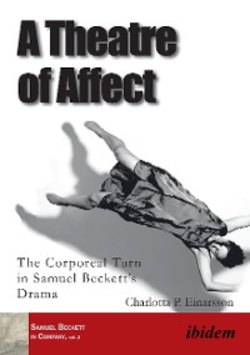Читать книгу A Theatre of Affect - Charlotta Palmstierna Einarsson - Страница 8
Introduction
ОглавлениеThose … who believe that they either speak or are silent, or do anything from a free decision of the mind, dream with open eyes.
Spinoza, Ethics
Have you ever tried to hide your sobs in the theatre? Become so excited or embarrassed that you could not keep still, or been suspended between tears and laughter when reading? Then you would have sensed the deep interconnections between body and mind that “marks a body’s belonging to a world of encounters” (Seigworth and Gregg 2010, 2). Affect means, “to have a material effect on; to make a material impression on; to influence, move, touch” (OED v3), Pre-verbal and unformed, affect resides in sensations yet to be cognised, seizing our whole sensorium. Affected, we are moved to respond even before we have time to think and as human beings we are therefore always responding to more than we are consciously aware of. That is to say, our engagements with the world are not merely dependent on our minds’ processing and evaluating the various situations we encounter, but on our bodies’ immersion in time and space.
A key element in Samuel Beckett’s theatre, affect is equal to, yet profoundly different from, language. The plays set up and organise encounters between audiences and various non-linguistic elements emerging, for instance through the tensions, directions, and rhythms of the characters’ bodies on stage. The sounds of characters rhythmically moving or the visual spacing of their bodies are therefore as important as anything the characters say. Beckett’s dramas are phenomenological presentations experimenting with the form of expression. The aim of these formal experiments is to intervene in the processes of signification and meaning-making before the mediating operations of language have emerged to take control. As a result, Beckett’s theatre of affect prompts audiences to forge attachments with the stage presentations beyond the level of language. In the pages that follow, I will move on to suggest not only that the integration of sense and sense-making in Beckett’s dramas is an important aspect of towards , but also that the reconfiguration of the aesthetic object taking place through this integration of body and mind has profound implications for the production of meaning in the context of performance.
